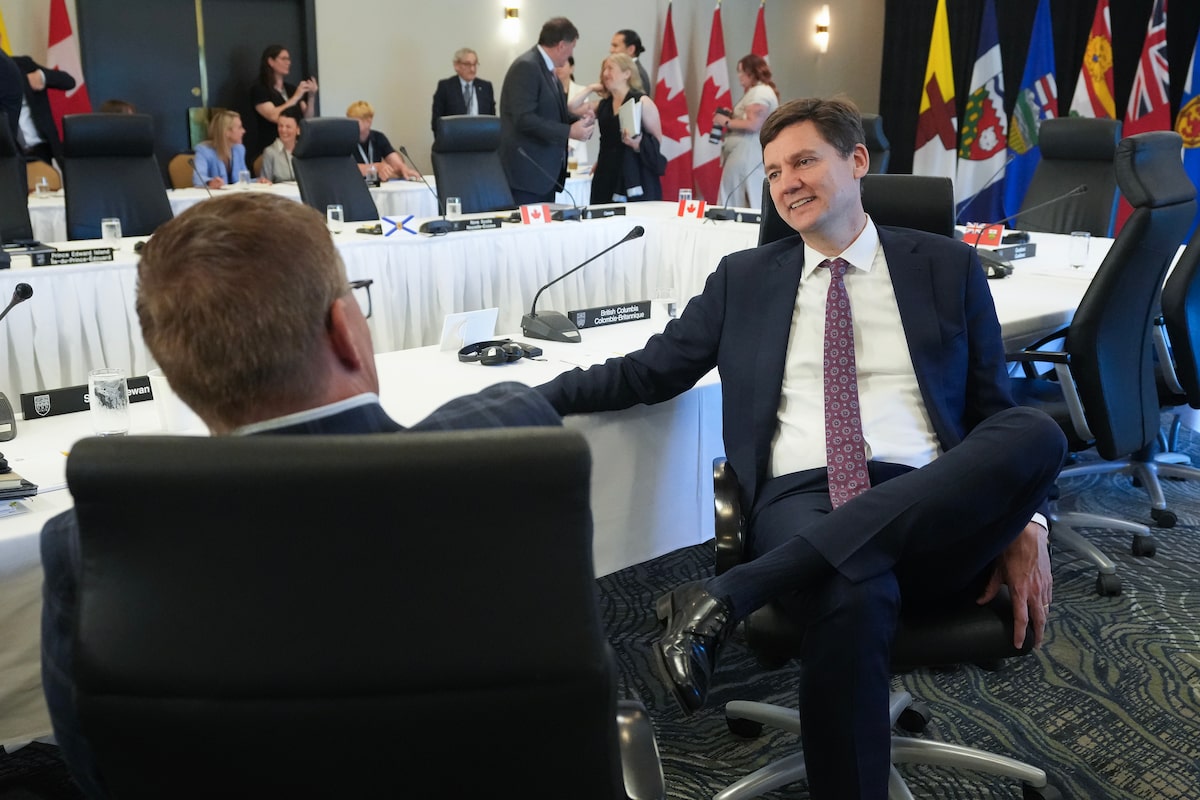B.C. Premier David Eby sits Tuesday during the meetings of Canada’s premiers in Huntsville, Ont. “What we learned is what everybody knows, which is that things are very unpredictable,” Eby said of Prime Minister Mark Carney’s briefing on progress on U.S. trade negotiations.Nathan Denette/The Canadian Press
British Columbia Premier David Eby says it’s not clear that Canada will end up striking a deal with the U.S. as the two countries negotiate a new trade and security pact under President Donald Trump’s August 1 deadline.
Mr. Eby, who is attending a summer gathering of Canada’s premiers in Muskoka this week, said Prime Minister Mark Carney briefed the premiers on the status of negotiations with the U.S. on Tuesday.
“What we learned is what everybody knows, which is that things are very unpredictable, incredibly fluid, that there continues to be hope for a deal on the Canadian side,” Mr. Eby told the Globe and Mail in an interview Wednesday.
“The sense that I had was that the Prime Minister is trying to get the best deal, but that it’s not obvious that there will be a deal.”
Mr. Carney joined the summer premiers’ meeting on Tuesday morning in response to U.S. President Donald Trump’s threat to raise tariffs on some Canadian goods to 35 per cent at the beginning of next month.
Coming out of those talks, the prime minister and several premiers said getting the best deal for Canada is what matters most, even if that means blowing past the countries’ Aug. 1 deadline.
Prime Minister Mark Carney said Tuesday that getting a trade deal with the U.S. is more important than hitting U.S. President Donald Trump’s Aug. 1 deadline.
The Canadian Press
While Ontario Premier Doug Ford has called for matching retaliatory tariffs on U.S. goods dollar-for-dollar if a deal isn’t reached, Mr. Eby said he supports retaliation but has concerns about the impact it might have on his province.
Others, such as Saskatchewan Premier Scott Moe and Alberta Premier Danielle Smith, have called for restraint, saying countertariffs only hurt Canadian industries.
The Prime Minister didn’t directly answer Tuesday when asked whether Canada would retaliate if the higher tariffs go into effect.
Mr. Eby said he’s proud of the American liquor boycott in B.C. and that many are not travelling to the U.S. unless it’s absolutely required. The U.S. ambassador to Canada recently said Mr. Trump thinks Canadians are “nasty” to deal with because of U.S. boycotts.
“We know the Americans are feeling it. We heard the comments of the ambassador that we’re nasty Canadians for doing this. And the concern that I have is that any retaliatory measures minimize impact on British Columbians and on Canadians and maximize the impact on Americans,” he said.
Mr. Eby added that the retaliatory measures imposed by the federal government so far “disproportionately impact” his province, saying it’s costly for his province to import steel from eastern provinces.
He said he’s been advocating for reaching an agreement on the long-running Canada-U.S softwood-lumber dispute, saying for the first time Canadian companies appear willing to discuss issues like quotas on the amount of timber sent to the U.S.
Quebec Premier says any new trade deal with the U.S. needs to have specific time frame
The premiers, who are wrapping up their meeting on Wednesday, also talked about nation-building projects and internal trade, and will continue discussion on health care and bail reform before a final press conference Wednesday.
The second major piece of Mr. Carney’s talks with the premiers was his government’s One Canadian Economy Act, known as Bill C-5, which gives the federal government the power to fast-track major projects of national interest.
The Prime Minister said a new major projects office will be open by Labour Day, which will provide a single point of contact for governments and project proponents, although the final list of projects has not been revealed.
Mr. Eby said he gets frustrated by Alberta Premier Danielle Smith’s push for a pipeline to the west coast, saying it’s causing “significant grief in the northwest among First Nations that are close partners of ours,” and that there isn’t a realistic proposal for one.
In a joint communique issued on Tuesday, the premiers also called for closer engagement with China to improve the overall trade relationship.
Canada has an opportunity to reset our relationship with China – and, in a rare twist, on our terms
Mr. Ford told reporters Wednesday that dealing with China is a reality.
“Our enemy of our enemy is our friend. And I don’t consider Americans enemy, but right now President Trump himself is acting like the enemy,” Mr. Ford said.
“As long as China plays fair and doesn’t undercut our markets – be it the auto sector or any sector – I have no problem dealing with them, because we’re already dealing with them.”
